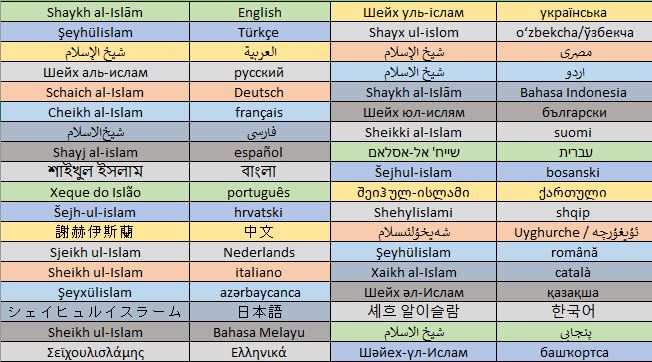|
List Of Sheikh-ul-Islams Of The Ottoman Empire
The following is a list of Sheikh-ul-Islams of the Ottoman Empire. After the foundation of the Empire around 1300, the title of Sheikh-ul-Islam, formerly used in the Abbasid Caliphate, was given to a leader authorized to issue legal opinion or fatwa. During the reign of Sultan Murad II, (1421-1444, 1446-1451) the position became an official title, with authority over other muftis in the Empire. In the late 16th century, Shaykh al-Islam were assigned to appoint and dismiss supreme judges, high ranking college professors, and heads of Sufi orders. Prominent figures include Zenbilli Ali Cemali Efendi (1445-1526), Ibn-i Kemal (Kemalpasazade) (1468-1533), Ebussuud Efendi (1491-1574) and Muhammad Zahid al-Kawthari (1879-1952). List During the existence of the office (from 1424 to 1922), there were in total 131 Sheikh-ul-Islams. The longest-serving officeholder was Ebussuud Efendi for 29 years, the shortest was Memikzade Mustafa Efendi for 13 hours.For a list of ''şeyḫülislāmlar ... [...More Info...] [...Related Items...] OR: [Wikipedia] [Google] [Baidu] |
Shaykh Al-Islām
Shaykh al-Islām ( ar, شيخ الإسلام, Šayḫ al-Islām; fa, شِیخُالاسلام ''Sheykh-ol-Eslām''; ota, شیخ الاسلام, Şhaykḫu-l-İslām or ''Sheiklı ul-Islam''; tr, Şeyhülislam) was used in the classical era as an honorific title for outstanding scholars of the Islamic sciences.Gerhard Böwering, Patricia Crone, Mahan Mirza, The Princeton Encyclopedia of Islamic Political Thought, p 509-510. It first emerged in Khurasan towards the end of the 4th Islamic century. In the central and western lands of Islam, it was an informal title given to jurists whose ''fatwas'' were particularly influential, while in the east it came to be conferred by rulers to ''ulama'' who played various official roles but were not generally ''muftis''. Sometimes, as in the case of Ibn Taymiyya, Ibn Taymiyyah, the use of the title was subject to controversy. In the Ottoman Empire, starting from the early modern era, the title came to designate the chief mufti, who over ... [...More Info...] [...Related Items...] OR: [Wikipedia] [Google] [Baidu] |
Hacı Mustafa Sunullah Efendi
Hacı is the Turkish spelling of the title and epithet Hajji. It may refer to: People * Hacı I Giray (died 1466), founder and the first ruler of the Crimean Khanate * Hacı Ahmet ( 1566), purported Turkish cartographer * Hacı Arif Bey (1831–1885), Turkish composer * Hacı Arif Örgüç (1876–1940), Ottoman and Turkish military officer * Hacı Bayram-ı Veli (1352–1430), Turkish poet * Hacı Halil Efendi (died 1821), Ottoman Sheikh ul-Islam * Hacı İlbey ( 1305–1371), Ottoman military commander * Hacı İvaz Mehmet Pasha (died 1743), Ottoman grand vizier * Hacı Karay (1950–1994), Turkish drug trafficker * Hacı Mehmet Zorlu (1919–2005), Turkish businessman * Hacı Ömer Sabancı (1906–1966), Turkish entrepreneur, founder of Sabancı Holding ** Hacı Sabancı (1935–1998), Turkish businessman, his son * Hacı Pasha ( 1348–1349), Ottoman grand vizier See also * Hacı, İpsala * Hajji (name) Hajji (also transliterated as Haji, Hadji, or Hacı (Turkish), ar, ... [...More Info...] [...Related Items...] OR: [Wikipedia] [Google] [Baidu] |
Hoca Sadeddin Efendi
Hoca Sadeddin Efendi ( ota, خواجه سعد الدین افندی; 1536/1537 – October 2, 1599İsmail Hâmi Danişmend, ''Osmanlı Devlet Erkânı'', Türkiye Yayınevi, İstanbul, 1971, p. 118. ) was an Ottoman scholar, official, and historian, a teacher of the future Ottoman sultan Murad III. His name may be transcribed variously, e.g. ''Sa'd ad-Din'', ''Sa'd al-Din'', ''Sa'düddin'', or others. He was also called by the title of "Câmi'-ür Riyâseteyn". When Murad became Sultan, Sadeddin became his advisor. Later he fell out of favor, but was appointed Sheikh ul-islam, a superior authority in the issues of Islam. Sadeddin is the author of ''Tâc üt-Tevârîh'' (Tadj ut-Tewarikh, “Crown of Histories”), a history of the Ottoman Empire in prose and verse. He had at least five sons: Mehmed Efendi (died 1615), Esad Efendi (died 1625), Mesud Efendi (died 1597), Abdülaziz Efendi (died 1618), and Salih Efendi. Publications *Hoca Sadeddin Efendi, ''Tâcü't-tevârih''. ... [...More Info...] [...Related Items...] OR: [Wikipedia] [Google] [Baidu] |
Hamit Mahmut Efendi
Hamit is the Turkish spelling of the Arabic masculine given name Hamid. People named Hamit include: * Hamit Altıntop, Turkish footballer * Hamit Kaplan, Turkish sport wrestler * Hamit Karakus, Dutch politician * Hamit Zübeyir Koşay, Turkish archaeologist * Hamit Şare Hamit Şare (born February 19, 1982 in Bursa, Turkey) is an Olympic alpine skier discipline. Hamit began skiing at five years of age. He joined the Turkish national ski team already in 1993. He won seven national titles, represented Turkey 79 tim ..., Turkish alpine skier {{given name Turkish masculine given names ... [...More Info...] [...Related Items...] OR: [Wikipedia] [Google] [Baidu] |
